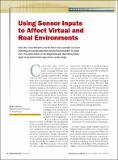Using Sensor Inputs to Affect Virtual and Real Environments
Author(s)
Coleman, Beth
DownloadColeman Pervasive IEEE.pdf (2.947Mb)
PUBLISHER_POLICY
Publisher Policy
Article is made available in accordance with the publisher's policy and may be subject to US copyright law. Please refer to the publisher's site for terms of use.
Terms of use
Metadata
Show full item recordAbstract
This article discusses several networked media projects that use sensor technology to transmit data from real-world environments to virtual environments. The Eolus One project uses an experimental virtual control room to run building systems and provide a better communication network among its users. A 3D application design group called green phosphor creates code for translating n-dimensional information into 3D interactive formats for real-time effects. The Parsec voice controller system uses sonic inputs to control 3D graphical objects on the second life virtual platform. This article focuses on the design principles applied by the three projects at this experimental stage of x-reality design.
Date issued
2009-07Department
MIT Program in Writing & Humanistic Studies; Massachusetts Institute of Technology. Program in Comparative Media Studies/WritingJournal
IEEE Pervasive Computing
Publisher
Institute of Electrical and Electronics Engineers
Citation
Coleman, B. “Using Sensor Inputs to Affect Virtual and Real Environments.” Pervasive Computing, IEEE 8.3 (2009): 16-23. © 2010 IEEE
Version: Final published version
Other identifiers
INSPEC Accession Number: 10780884
ISSN
1536-1268
Keywords
3D applications, advanced visualization, automation, collaborative tools, copresence, cross-reality, design communication, distributed networks, pervasive computing, real-time distributed, sensors, simulation, synchronous engagement, virtual worlds, x-reality